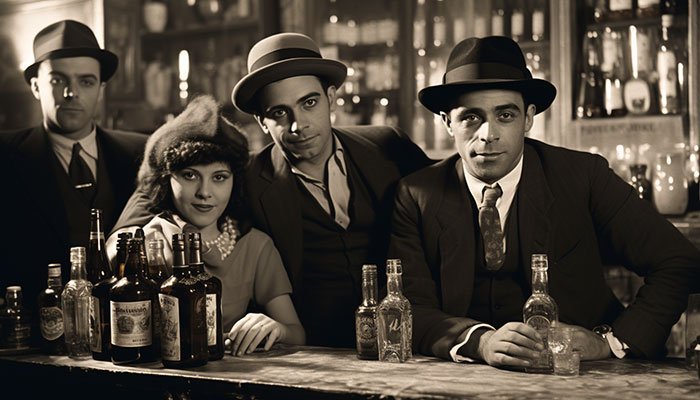
Prohibition
Known as the “Noble Experiment,” this was a period in American history when the sale, production, and transportation of alcoholic beverages were banned nationwide. The intent was to curb alcoholism, family violence, and saloon-based political corruption. Following: Prohibition was backed by the 18th Amendment, ratified in 1919, and the subsequent passing of the Volstead Act. The most influential of the various groups driving the movement was the Temperance Movement, which believed that Prohibition would lead to a more moral and productive America.
The term “speakeasy” originated from the practice of speaking quietly or “easily” to avoid detection. These were hidden, secret bars where patrons could enjoy a drink away from the prying eyes of the law. Often concealed behind seemingly innocuous storefronts—like soda shops or laundries—speakeasies became hubs of the Roaring Twenties’ nightlife. To gain entry, one needed to know the secret password, creating an air of exclusivity and intrigue. Jazz music, flappers, and Charleston dance defined the scene inside.
While speakeasies were where alcohol was consumed, illicit breweries and moonshining operations were where it was produced. With the demand for alcohol persisting, many resorted to brewing their drinks. This led to the emergence of “bathtub gin”, so named because people used bathtubs to mix large batches of this homemade spirit. Others produced moonshine, a type of whiskey distilled under the cover of night to evade authorities. However, this illicit alcohol sometimes proved dangerous, leading to poisoning or even death because of toxic additives or unsanitary brewing conditions.
As the decade progressed, the unintended consequences of Prohibition became glaringly evident. Rather than curbing alcohol consumption, it had pushed it underground, giving rise to organised crime syndicates and gangsters like Al Capone, who profited immensely from this illegal trade.
By the 1930s, the drawbacks of Prohibition had become undeniable. The economic losses, combined with the rise in crime and the need for job creation during the Great Depression, led to its repeal with the 21st Amendment in 1933.
Further reading: Prohibition


